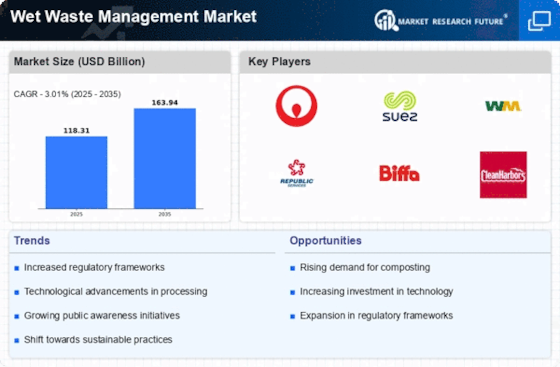Top Industry Leaders in the Wet Waste Management Market

The global wet waste management market is experiencing a surge in interest due to rising urbanization, environmental concerns, and increasing regulations. This dynamic space, however, is characterized by a fragmented landscape with a mix of established players and nimble startups vying for market share. Understanding the competitive strategies, key influencers, and recent developments is crucial for navigating this complex terrain.
Strategies Shaping the Market:
-
Technology and Innovation: Leading companies are heavily investing in technological solutions to optimize wet waste management. This includes smart bins with automated sorting, AI-powered waste collection optimization, and advanced composting and anaerobic digestion technologies. -
Sustainability Focus: Sustainability is a major differentiator, with companies emphasizing environmentally friendly solutions like bioplastics for waste bags, resource recovery from waste, and carbon-neutral operations. -
Vertical Integration: Established players are expanding their reach by integrating across the value chain, from collection and transportation to processing and disposal. This vertical integration offers greater control over operations and cost optimization. -
Partnerships and Acquisitions: Strategic partnerships with waste generators, technology providers, and municipalities are fostering innovation and market access. Acquisitions of smaller players with niche expertise are also prevalent. -
Local Focus: Adapting to regional regulations and cultural preferences is key. Companies are tailoring their offerings to specific waste compositions, infrastructure limitations, and consumer behavior in different markets.
Factors Influencing Market Share:
-
Operational Efficiency: The ability to collect, transport, and process wet waste efficiently and cost-effectively is paramount. Companies with robust logistics, optimized routes, and advanced waste processing facilities hold an edge. -
Compliance and Regulatory Expertise: Navigating the evolving regulatory landscape around waste management is critical. Companies with strong regulatory compliance expertise and experience in obtaining permits and licenses are well-positioned. -
Customer Relationships: Building trust and long-term partnerships with waste generators, from municipalities to households, is essential. Providing reliable services, transparent pricing, and customized solutions foster customer loyalty. -
Brand Reputation: A strong brand associated with sustainability, innovation, and community engagement attracts customers and investors alike. Companies actively engaging in environmental initiatives and promoting transparency build trust and market recognition.
List of the key major companies operating in the global Wet Waste Management Market are
- Clean Harbors Inc. of the United States
- Panda Recycling of Ireland
- SUEZ Environnement Co. S. A. of France
- Fomento de Construcciones Contratas of Spain
- Veolia Environnement S. A. of France
- Eco-Wise Waste Management Pvt. ltd of India
- Waste Ventures India of Spain
- Republic Services Inc. of the United States
- Sampurn(e) Environment Solutions Pvt ltd
- Covanta Energy Corporation of the United States
- Remondis SE and Co. Kg of Germany
- Advanced Disposal Services Inc. of the United States
- Progressive Waste Solution ltd of Canada
Recent Developments:
August 2023: Waste Management, a leading US waste management company, announces a partnership with a startup to deploy smart bins for automated waste sorting in select cities.
October 2023: Veolia Environment, a French waste management giant, acquires a composting company in Europe, expanding its portfolio of sustainable waste treatment solutions.
November 2023: A new AI-powered platform for optimizing waste collection routes is launched in the UK, attracting interest from waste management companies seeking to improve efficiency.
December 2023: A large investment fund announces a $100 million investment in a consortium of startups developing innovative solutions for anaerobic digestion of wet waste.










